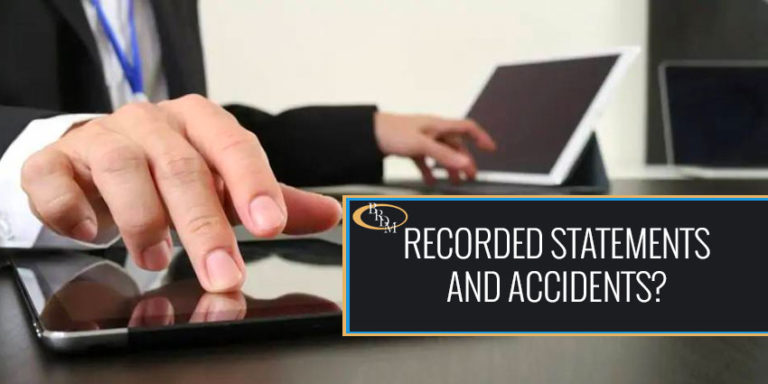After an accident, you should get prepared before speaking to an insurance company. That’s because a recorded statement could be particularly detrimental to your case if you say the wrong thing. In addition, once you make a statement on the record, you cannot change or reverse anything.
A Florida personal injury attorney can advise you on whether or not you need to give a recorded statement. Furthermore, you’ll want to ensure that you don’t say anything that could jeopardize your claim.
Read on to learn more about how a recorded statement could impact your claim.
Table of Contents
How Can a Recorded Statement Impact My Claim?
The slightest blunder could affect your insurance claim. In fact, most personal injury attorneys will advise against speaking to insurance companies before consulting your lawyer.
If you give a statement that is recorded, this is evidence that can be used against you in the future. So, if you are caught off guard or unprepared, you could say something that you later regret. Here’s an example: The insurance company asks where you are injured. You tell them that your back and neck hurt, but you don’t mention the headaches that you are having. The headaches get worse and you find out that you have a concussion. When you make a damages claim for the concussion, the insurance company will pull up the tape and show that you did not report it. You just cost yourself the opportunity to recover damages for that injury.
What Is a Recorded Accident Statement?
Following an accident, an insurance adjuster will contact all parties involved to investigate the accident. Their questions may be written or recorded and could later serve as evidence.
With a recorded insurance statement, the insurance company may start by asking you basic, expected questions. For example, they’ll ask you identifying questions like your name, address, phone number, date of birth, etc. Then they will ask you questions about the accident. They may ask you about:
- The identity of all passengers involved in the accident
- Location of the accident
- What caused the accident
- Types of damage
- Whether or not you were abiding by driving laws
- If there were any witnesses
- How the authorities responded
- If you were injured
- If you received any medical treatment
The insurance company will want you to consent to record your statement.
Why Do Insurance Companies Want a Recorded Statement?
Bear in mind that insurance adjusters want a recorded statement to use to their advantage. They want to try to find a reason to minimize or flat out deny your claim. Or they might try to find the slightest discrepancy in your accounts to make you look unreliable.
During a recorded statement, they may try to lead you to answers that will harm your case. They may also ask strategic questions that make the other party look innocent. If you share too much information, for example, details about a previous injury, they could assert that your injuries were unrelated to the accident.
Insurance adjusters are trained professionals in strategizing to make your statement work to their advantage. As a result, they generally try to get the responses they want from you. For example, they may ask you vague questions and allow you minimal time to answer or give your account of what happened. Or, they may steer you to provide answers that make you sound uncertain and therefore make your claim unreliable.
Lastly, insurance adjusters almost always contact you immediately after the accident. This is also a strategy that aims to catch you while you are in shock. Most accident victims experience shock, adrenaline, and high emotions right after an accident. Therefore, insurance adjusters will purposely try to speak to you while you are unprepared and most likely in a stressful state. They want to lock you into a story immediately.
Am I Obligated to Give a Recorded Statement?
No. You are not legally obligated to give a recorded statement. While the insurance adjuster may push you to provide a recorded statement, you can politely and firmly decline.
Instead of giving a recorded statement, you can opt to give your statement in writing. A written report will give you more time to think about your answers and only share necessary information. You also have the option to have your attorney provide a written statement on your behalf.
Advice for Giving a Recorded Statement
- First and foremost, contact your Florida personal injury attorney before you speak to the other party’s insurance company. Your attorney will provide legal counsel that protects your best interests and prepares you for questions the insurance adjusters may ask.
- Make sure you review your side of the story with your attorney before speaking with the other party’s insurance company. Your attorney will help ensure that you only discuss relevant details that will help your case.
- Try to keep your answers as brief as possible. Oversharing information can allow adjusters to take your answers out of context. Ultimately, they want to minimize your payout.
- Contact your insurance company immediately after the accident to notify them. You should cooperate with your insurance company and tell them your version of the story. You also don’t want it to come out later that you waited to contact your insurance company. The other party’s attorney or insurance company could argue that you delayed reporting the accident because your injuries were not that serious.
- The insurance adjuster representing the other party may seem warm and friendly. However, remember that they work for the other side. Even if they seem nice, refrain from sharing too much.
- Take the time to think before you answer. Only answer the question asked of you. You don’t need to volunteer too much information.
- Never admit guilt.
- Refrain from answering questions about potential injuries. Injuries take time to present after the accident. It’s also very likely that the adrenaline immediately following the accident is masking the actual severity of your injuries.
- Don’t sign anything without first consulting your attorney.
- It’s ok to skip questions that you can’t answer. If you don’t know the answer to a question, it’s better to be honest than guess or respond out of obligation.
Contact a Florida Personal Injury Lawyer Today
If you sustained injuries in an accident due to someone else’s negligence, you need an experienced Florida personal injury attorney. A knowledgeable, trustworthy Florida personal injury attorney can ultimately spell the difference between a win or a loss for your case. In addition, a skilled attorney will help ensure you get the total compensation for your injuries and damages.
As some of the top-rated Florida personal injury attorneys, Battaglia, Ross, Dicus & McQuaid, P.A., has a reputation built on professionalism, compassion, and dedication to our clients. Therefore, we take the time to listen to your story and get to know you. We want to understand all the ways your life has been affected by the accident.
We’ll do our best to make your life easier and help you navigate through the complex, challenging, and emotionally taxing times following an accident. In addition, we’ll give you the best legal advice to get the best outcome. Finally, we will happily answer your questions so you can make informed decisions.
We are an award-winning, established personal injury law firm, fighting for our clients for over 60 years, and have recovered more than $145 million in awards.
Contact us today, and we will fight to get your desired results.




